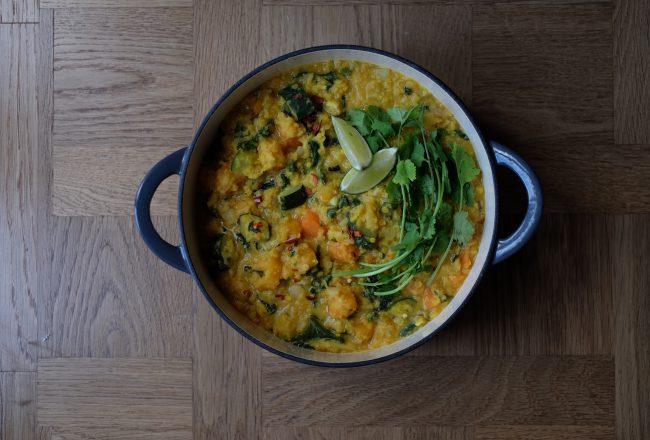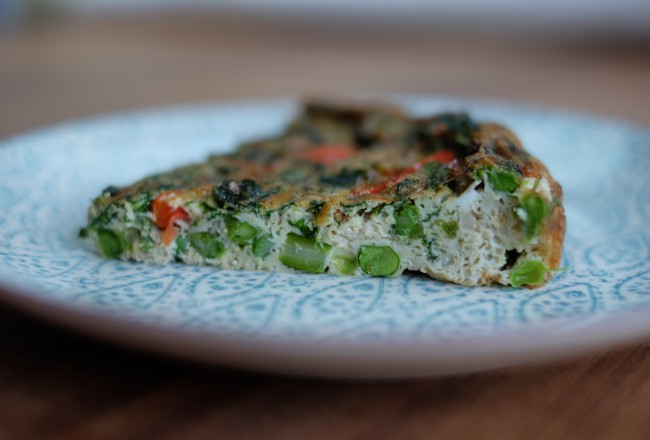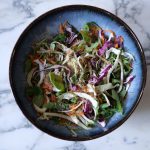These are the questions. Which method of juicing is nutritionally superior? What does cold-pressed mean? And perhaps most importantly, is juice good for my health? Is it necessary? Should I do a juice cleanse every so often?
The most interesting thing I have just discovered is the very low level of actual scientific research backing up the juice craze. While it appears healthy to eat more fruit and vegetables, our view is that juicing them is not necessary and not necessarily a good idea.
Cold-pressed vs centrifugal (normal) juicing
Juicing is a process that extracts the juices from fresh fruit, vegetables and herbs. The resulting liquid contains most of the vitamins and minerals naturally present in the whole produce, but without any pulp or seeds. Cold-pressed juice is a method of juicing that is a buzzword among juice enthusiasts as superior for your health. It works by crushing and pressing fresh produce to extract juice from it, rather than using heat and speed to push juice out of it as in centrifugal juicing. It is a slower process and in the health industry, “slow food” almost always has nutritional superiority. The cold-pressed industry maintains that the speed and the heat of the centrifugal process destroy beneficial enzymes in the produce and so lower the nutritional value as well as impair the taste. There is very little research (and none that we can find that is not clearly affected by commercial bias) to confirm or deny the claims behind cold-pressed juice. However, even in the absence of this evidence, we do prefer cold-pressed juice companies for a different reason – they tend to focus on appealing to the health-obsessed niche. As such, their produce is more likely to be organic, locally sourced with a clearer supply chain and/or with more optimal storage and handling facilities. Further, there is the possibility that the process does make them more nutrient dense.
Fruit and vegetables are best consumed whole
The main problem with both centrifugal and cold-pressed juices is that the process of juicing removes any fibre from produce. Fibre is a beneficial part of your diet, which:
- helps you absorb all the nutrients from the fresh produce in your juice;
- helps slow the digestion of food so that your blood sugar levels do not spike; and
- provides important fuel so that beneficial bacteria can thrive within the gut.
Cold-pressed or not, the human body is not meant to digest 5 pieces of whole fruit in a few glugs. The sugar from fruit in juice form is very rapidly absorbed by the body which places strain on the liver as it seeks to metabolise it. This can lead to all sorts of problems as discussed here. Most juices are only palatable because of the fruit content.

Furthermore, we are concerned that the juice trend encourages people to think that having a juice can replace your fruit and vegetable intake for the day, which is simply not true. While a vegetable-only juice will give you extra vitamins and minerals if you are pressed for time or travelling, it is not a shortcut to a balanced diet. Having a green juice is not the equivalent of a nutritious salad at lunch or steamed greens at dinner. The process of chewing whole food is how the human body is supposed to ingest nutrients. It is important to fill at least half your plate at every meal with a variety of vegetables and this is not just due to the nutrients these vegetables provide but also because their fibre content helps to fill you up so that you do not fill your plate with more than the recommended amount of fats, starchy carbohydrates and protein. This is why a juice should not replace whole vegetables in your diet; if anything it should just be an adjunct to it. There is no credible scientific data backing up any claims that juicing is in some way nutritionally superior as it enables you to eat a lot more of (for example) kale nutrients than you would eat in one go. More is not always superior – the process, source and quality of your food is often more important than the quantity. Since I mention kale particularly, if you are a regular juicer of kale and other greens, you may in fact be eating an excess of vitamin K, which would interfere with certain prescription medications (like blood thinners). There IS scientific data showing that you need the fibre content of the fruit or vegetable to ingest some of the nutrition: some anti-oxidants are naturally bound to plant fibres which are lost in any juicing process. The claim of juice enthusiasts that removing the fibre makes nutrients easier to absorb is completely incorrect: there is no scientific research to support it. Further, there is an abundance of evidence linking whole fruits and vegetables to reduced risk of disease; the only studies linking juice consumption to reduced risk of disease are very tenuous and inconsistent. If juicing is stopping you eating whole fruit and vegetables, you are making a crucial nutritional mistake.
Juice Cleanses
Juice cleansing is a “detox” diet that can last from a few days to several weeks in which a person consumes only fruit and vegetable juices to obtain nutrition while otherwise abstaining from eating food. This is alleged to bestow glowing skin, more energy, cleanse your body of toxins that create acidity in your digestive system, and de-bloat you. There is very little, if any, scientific evidence to back up any of these claims.
The human body has a way of cleansing itself – that is the job of the liver and kidneys, which process and break down toxins. A healthy detox to give your liver a helping hand would be to give up or reduce alcohol, refined sugars, refined carbohydrates and processed food. If you are juicing with non-organic fruit and vegetables, you will be consuming toxins via pesticides that are potentially much worse than those you are trying to de-toxify your body from. There is absolutely no evidence that the human body needs detoxified by eliminating solid food.
Juice cleanses will make you lose weight, at least in the short term. They tend to have less calories than average diets, hence the claims of dramatic weight loss from juice cleanses. The weight loss tends to be temporary and is put on again fairly soon after starting to eat solid food. Further, the severe calorie restriction in juice diets could slow your metabolism in the long term, which is a risk not worth taking. Aside from that, a juice diet lacks so many important nutrients. A balanced healthy diet includes protein, wholegrains and fibre.
Summary and my diet
Vegetable-only juices have a role in a healthy diet and if you enjoy them, and do not eat them at the expense of whole vegetables, go ahead, especially for those vegetables, herbs and super-powders that you would not otherwise ingest at all.
We like the following in particular:
- Tomato juice – actually a fruit but low in sugar and very high in the phytochemical lycopene, an antioxidant linked with reducing the risk of cardiovascular disease and prostate cancer. Commercial tomato juices are high in sodium so best not consumed more than once or twice a week.
- Green juices that consist only of vegetables and herbs (I find lemon, ginger and carrot to be great for taste improvements in the absence of fruit). Be aware that some green juices are over 50% apple. You should check the contents of any juices you are not making yourself. Be careful not to fall into the trap of thinking that anything green must be good for you. It could be apple juice with a sprinkle of spirulina and three baby kale leaves.
- Juiced items that you would not otherwise eat raw (such as beetroot) or containing super-powders that you would not otherwise consume (such as spirulina or chlorophyll).
Juicing is absolutely not my thing. I happen to love raw greens in salads and steamed vegetables in the evening so I do not really feel the need for juice in my life. For some reason, I often feel slightly sick after drinking juice. Any juice that tastes really delicious is probably high in sugar and not very good for you. Remember that the recommendation is to eat only two pieces of fruit each day so really a juice should only contain max one piece of fruit.
The only fruit juice I drink is freshly squeezed orange juice, very rarely and preferably in a mimosa, with the exception of tomato juice which I love and drink about once a week. I do like carrot juice if it is completely fresh, but not so much that it is worth cleaning my very under-utilised juicer for afterwards, so I only have it in hotels or juice bars once in a while. I would not go on a juice cleanse if I was paid to do so. The idea of giving up wholegrains, protein, fibre, whole fruits and whole vegetables is completely absurd to me. I get hungry after delaying one meal, let alone missing one; giving up solid food is totally inconceivable. I have dieted very occasionally (shoot pressure), but it is not by juicing. If you do it and you love it and it makes you feel great, go for it! Some people say they feel so alive and clear headed afterwards. I suspect this might be because the whole concept of a cleanse forces them to give up processed food, alcohol and refined carbohydrates, rather than the fact that the diet is liquid and consisting solely of juice. Whatever the reason, if you enjoy it and it works for you, go for it! Please do not do it for too long and please take some time out while you are doing it so that your body can cope! A juice cleanse will leave you vulnerable to headaches, nausea, diarrhea and dizziness. I have always been fascinated in metabolic functioning and I just do not think it is right to give your digestion a rest as juice fasters aim to do. The human body is not designed that way. It cannot not affect the metabolic rate to subsist on so few calories, without any protein or fibre. Maybe I am biased and I read the available research with a sense of bias because I simply dislike juice. I love food too much! A juiced apple has no appeal compared with a whole apple and a glass of water, which is infinitely superior nutritionally. I would sooner eat a raw kale salad than a glass of kale juice. Since so many vitamins are fat soluble (olive oil on greens is a good idea), they are therefore potentially totally wasted in juice format unless you eat a snack on the side anyway or use coconut oil or other fats within your juice. Bio-availability and ingestion is relevant and I think on this, the juicers are mistaken – they think that they are making it easier for their bodies to ingest a lot of nutrients but in fact the research studies available and nutritional science suggests the opposite. That is my opinion based on what I have read.
BEETROOT, CARROT AND GINGER JUICE
I am giving you a recipe even though I am not a juicer! This is what I might make if I was since I cannot really think of an alternative way to eat raw beetroot. Beetroot is highly nutritious. It is a unique source of phytonutrients called betalains. The carrot makes the juice slightly sweet while the ginger and lemon gives it a zingy kick.
Ingredients:
- 2 large carrots
- 1 beetroot
- ½ to 1 inch fresh ginger
- ½ lemon
- 2 handfuls of greens (spinach, kale or cavolo nero)
Juice in a cold-pressed juicer and drink immediately.







